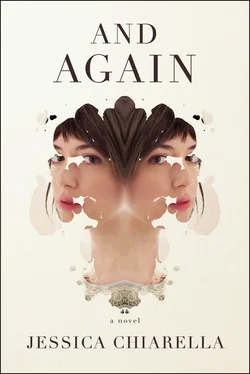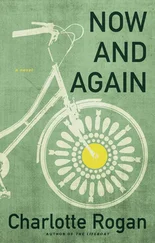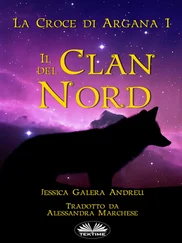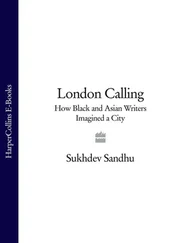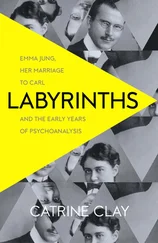I set Jack up with some cereal at the kitchen table and go upstairs, returning to our bedroom. I sit on the foot of our bed. Tom glances up at me when he feels the mattress shift.
“Hey,” he says, propping himself up on his elbows. There’s a red crease in the side of his face from the pillow. “What’s up?”
“I’m not pregnant,” I reply.
“What?” he sits up, fast, as if there was a task he’s forgotten to handle and the result has been the loss of our child. “What are you talking about?”
“I’m not pregnant anymore.” I say it slowly, trying to keep my tone even. Trying to keep from repeating it again and again until he finally figures out what the words mean, that it’s too late for anything to be done, that all of his questions are useless.
He’s silent for a moment, staring at me aghast. “When?” he finally asks.
“A few weeks ago. I didn’t want to tell you.”
“Oh God,” he says, and reaches toward me, his arms outstretched. I put up both of my hands to ward him off.
“No,” I say. I can see it when he changes gears, when anger pours into his expression.
“Well, why the hell wouldn’t you tell me when it happened, Linda?” he asks, his voice a bit too loud for the quiet, lingering night.
“Because I wasn’t sure how I felt about it. I needed time,” I reply, still calm, trying to stay calm.
“Jesus, what about what I need?” he asks, nearly shouting, his voice high, an almost comical pitch. “All of these years, all of it. I can’t even remember what it feels like to need something and to get it.”
“What did you need, Tom?” I ask.
“I needed,” he begins, but catches himself. He slumps a bit, his bare shoulders sagging. He’s a very pale shade of white, as if he hasn’t seen the sun in a while. Small, wayward hairs curl at odd intervals on his shoulders, the first true sign of age. He is so sad, and so decent, that he will not answer. So I do it for him.
“You needed me to die. In the hospital, in those eight years. That’s what you needed.”
His knobby fingers cover his face. “Yes,” he whispers. “Because I loved you. And it was awful. I just lost you, and lost you, and there was no end to it.”
“You know, it’s funny,” I say, wishing I could cry too, to prove to him that I’m still human. But it’s impossible to conjure the emotion. For me, it’s a simple truth, one from which I did not need to hide. “I wished for the same thing.”
“God, I wish it could have been different for us,” he says, his voice strangled. I want to love this man, love him enough at least to comfort him. But I don’t have it in me.
“I know.” Thinking back, this is not so different from how we’ve always been, even before the accident. I’ve always been the strong one, the one who sets the course for us. It must have been so difficult for him, with me gone.
“I know about Scott,” he says then. Scott. I think of the park bench, my children asleep in the back of our van. “He came to the house a few weeks after your accident. I had no idea who he was, until he broke down sobbing in our living room. He said he needed to see me. That I was the only one who would understand what he was going through. We ended up talking, for, I don’t know. Hours probably.”
He pauses, and I can’t imagine anything that might come next. It is as if my entire estimation of Tom, and everything he is capable of, has evaporated into the air.
“It was, in a strange way, just what I needed,” he says. “To talk to someone who knew you the way I did.”
My body is rigid with astonishment. I almost want to take my pulse, to make sure everything has not shut down from the surge of shame and confusion roiling within me. When I speak, my voice is breathless, a child’s voice.
“Why didn’t you leave me there? Divorce me? If you knew?” I think of all the different ways his life might have proceeded without me, all of the mothers my children could have had. Mothers who were more capable and more selfless than me. Tom reaches forward and takes one of my hands. His is so warm, I feel only half-alive by comparison.
“Because you would have had no one,” he says.
I pull my hand from his. There is nothing else to be done, because I will never be able to love this man in the way he deserves. I think of my suitcase in the closet. I think of the world, the whole world, that exists outside this house and the people in it.
“We can try again,” he says. “For a baby.”
“It’s not going to make a difference,” I reply.
“Are you going to leave?” he asks, and he looks so much like his son, our son, with his red, blotchy face, that I can almost love him for the resemblance alone. Almost.
“Did you want to have a baby to keep me from leaving?”
He doesn’t reply. We are at an impasse, we look at each other for a long time. Finally, I blink. Once.
“Jack tried to make us pancakes and broke a measuring cup. Can you clean it up?” I leave before he can say anything, shutting myself in the bathroom and listening as he plods down the stairs to the kitchen, where my children are eating their breakfast and trying to avoid the shards of glass.
I put on the terrible sneakers I found in the attic, the ones with the wings inked into the heels, and creep down the back stairs and out into the lingering pre-dawn darkness. It was always easiest to run just before dawn, when the shadows of night are only beginning to recede, before the sun rises and heats the brick and concrete of the city until the air is thick with humidity. There’s an hour, when the sky begins to lighten in the east, before the city stirs, when everything is soft and cool and brimming with life. It is the hour in which I could always forget the things that weighed on me.
I run down Hinman to Main and then east to the lakefront. The water looks swollen and choppy, like it might rise up and chase me as I skirt its tide, and by then all of my muscles are warm and loose, and I find another gear. I wait to grow tired, for my limbs to take on that familiar lactic-acid heaviness, for my chest to tighten and protest the exertion, but this body does nothing but obey. It does not protest. Every breath becomes the first breath after being underwater, kicking hard for the surface and splashing up, gulping hard to get enough air. Every breath feels that sweet.
I pass other people on the path, couples with strollers and people walking dogs, other runners. I can feel my body charging forward, my heart drumming the pulse of blood through my limbs, synapses firing like roman candles, my breath, the patter of my feet on the pavement. Everything is rhythmic. A machine, churning away, breaking through the air around me, my gears and pistons and joints well oiled and endorphin-soaked. The world around me shimmers, resplendent with morning light and the gleaming magic of moving fast, effortlessly.
I fly along as the lake begins to glitter with the first bits of sunlight breaking over the horizon, and my body feels so good, so crazy good, that I can almost convince myself that it was all worth it, just for this. Just for a moment like this. I know the feeling will end as soon as I turn back and head for home, rejoin my family, unpack my hidden suitcase. But for a little while, the ability to forget is not a curse. Sometimes forgetting is a gift, too.
I wake the morning of our last group meeting startled and breathless. Unsure, for a moment, of where I am. And then I cross the thin veil of sleep, when the whole world and all of its truths wash inward in that one potent moment. I remember it all, in an instant, rushing back like forgotten memories. But that doesn’t blunt the feeling held over from moments ago, and a kind of muted joy sits in my chest. I walk with it, through my morning and out into the world, all the way to group. With that feeling of being held.
Читать дальше
